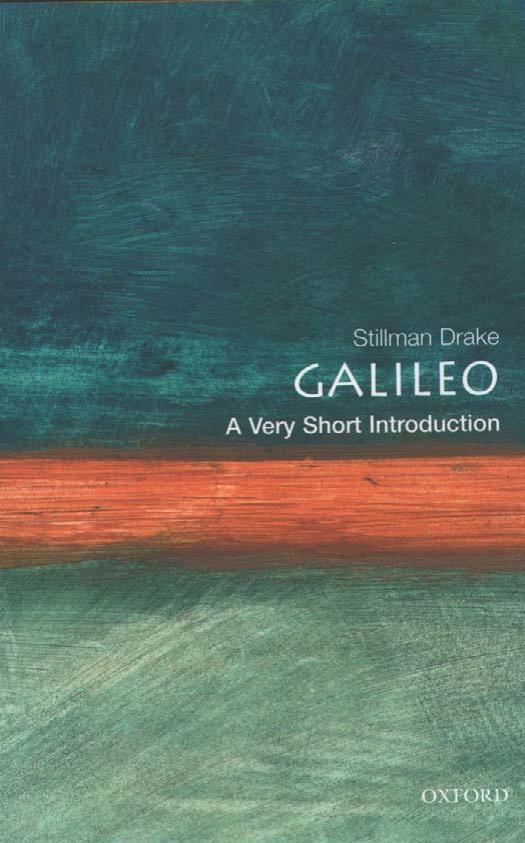Galileo: A Very Short Introduction by Stillman Drake

Author:Stillman Drake [Drake, Stillman]
Language: eng
Format: epub, pdf
ISBN: 9780192854568
Publisher: Oxford University Press
Published: 2001-12-15T06:00:00+00:00
How much less would his sublime intellect be celebrated among the learned! For as I said before, we may see that with reason as his guide he resolutely continued to affirm what sensible experience seemed to contradict. (D 339)
This may appear inconsistent with Galileoâs restriction of science, mentioned above, but it is not. Copernicus made no appeal beyond âsensible experiences and necessary demonstrationsâ, and once this particular puzzle was solved by the former, it was easy to provide the latter. Galileoâs point here was that in science it is commendable to reserve judgement with respect to problems not yet solved and to proceed on a preponderance of evidence. It was no scientific solution to introduce arbitrary speculations. Thus in the dispute over mountains on the moon, both Galileoâs German opponent and Ludovico delle Colombe, a philosopher at Florence, proposed to defend the moonâs smooth spherical surface by saying that it was covered with transparent crystal, beneath which Galileo saw mountains he mistakenly supposed to be on its surface. Colombe sent this idea to Clavius at Rome, where the secretary of Cardinal Joyeuse wrote to get Galileoâs reply for that very friendly cardinal. Galileo answered that he would grant his adversaries this crystalline substance if they, with equal courtesy, would then allow him to construct of it mountains ten times as high as those he had actually measured on the moon.
This technique of replying to opponents by drawing consequences compatible with their own assumptions which they themselves could not accept, but could not logically refute, is called argument ad hominem. It enables one to destroy a position without even taking any firm position of oneâs own, and Galileo used it frequently. The logic of such arguments is often missed by his critics today, who believe him to have asserted various things as true which he presented only to deprive specified arguments of the power to prove what they claimed to prove.
The first problem Galileo attacked at Florence was to determine orbits and periods for Jupiterâs four satellites. That task was so difficult that Kepler had publicly questioned the possibility of its accomplishment. In December, sending to Prague in anagram form his discovery of the phases of Venus, Galileo mentioned that he was on the track of obtaining the satellite periods as well. (Galileo used anagrams in order to be able to establish dates of discoveries later, if priority claims arose. The letters or words describing a discovery were scrambled, and then sent in a dated letter to a friend. Anagrams were similarly used later by Huygens and by Newton.) Galileoâs clue to the satellite periods worked out very well; he had the basic data necessary for predictions by March 1611, and during a visit to Rome in April he began compiling tables of satellite motions.
The first scientific society of lasting significance had been founded at Rome in 1603 by four young men headed by Federico Cesi, who named it the Lincean Academy. Cesi gave a banquet for Galileo at which the word âtelescopeâ was coined and the guests observed the new discoveries in the heavens.
Download
Galileo: A Very Short Introduction by Stillman Drake.pdf
This site does not store any files on its server. We only index and link to content provided by other sites. Please contact the content providers to delete copyright contents if any and email us, we'll remove relevant links or contents immediately.
Machine Learning at Scale with H2O by Gregory Keys | David Whiting(4268)
Never by Ken Follett(3891)
Harry Potter and the Goblet Of Fire by J.K. Rowling(3818)
Unfinished: A Memoir by Priyanka Chopra Jonas(3359)
Fairy Tale by Stephen King(3316)
The Man Who Died Twice by Richard Osman(3047)
Will by Will Smith(2883)
Rationality by Steven Pinker(2333)
Can't Hurt Me: Master Your Mind and Defy the Odds - Clean Edition by David Goggins(2288)
The Dark Hours by Michael Connelly(2285)
It Starts With Us (It Ends with Us #2) by Colleen Hoover(2273)
The Storyteller by Dave Grohl(2205)
Friends, Lovers, and the Big Terrible Thing by Matthew Perry(2189)
The Becoming by Nora Roberts(2167)
The Dawn of Everything: A New History of Humanity by David Graeber & David Wengrow(2165)
The Stranger in the Lifeboat by Mitch Albom(2097)
Cloud Cuckoo Land by Anthony Doerr(2067)
Love on the Brain by Ali Hazelwood(2031)
Einstein: His Life and Universe by Walter Isaacson(1991)
